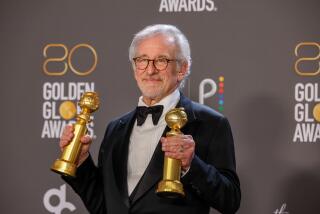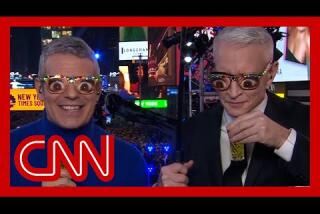Y2K Might Be a Boon for TV
- Share via
Concert promoters, restaurants and hotels will likely be the losers if an unusual number of people stay home on New Year’s Eve, preferring to sit out potential Y2K glitches in the warmth of their living rooms.
One of the winners, meanwhile, assuming that polling data turns out to be accurate, could be television.
Television viewing traditionally plummets due to New Year’s festivities, but more people are talking about passing on such events this year, an assertion supported by the many hotels slashing room rates and concerts advertising that good seats are still available.
All of this could wind up being a boon to TV networks, which are dressing up in their finest by offering a variety of news and entertainment options--in some instances dedicating vast resources to chronicling the arrival of 2000.
Both broadcast and cable channels are approaching Y2K as a major event, offering them the opportunity to reinforce their image as destinations to which viewers can turn when seeking information in times of possible crisis. CNN, for example, is planning more than 100 hours of coverage, which will be telecast both in the U.S. and abroad, as executives discuss their deployment of personnel in almost military terms.
“It’s a natural for CNN,” said Sid Bedingfield, the network’s executive vice president. “We want to use our global reach to cover this story. . . . It’s really what we do.”
The question lingers how many people will be remaining home to watch. Generally, TV usage among adults age 18 to 49 drops about 20% on New Year’s Eve versus a normal night, with more sizable declines among adults under 34 and teenagers, who go out in even bigger numbers. By contrast, viewing by children increases, as many are allowed to stay up later to watch the official change to the new year.
A three-year track of New Year’s Eve viewing by Nielsen Media Research indicates the overall percentage of homes using TV usually falls off about 13% versus a comparable night in December, which explains why all the broadcast networks simply aired reruns of their regular prime-time series a year ago.
The current year, however, could result in a much bigger TV audience, especially if anxiety about computer snafus and terrorism prompts people to remain indoors.
“There is a real possibility that the numbers will be over what we see on a regular New Year’s Eve,” said Alan Wurtzel, NBC’s president of research and media development.
Various television outlets--including ABC, PBS and Pax TV--will provide marathon daylong coverage of millennium festivities, mixing news with music and entertainment. And cable channels are weighing in with their own assortment of tidbits for couch potatoes--everything from marathons of “The Jetsons” cartoons to madcap comedies or Elvis Presley movies.
Still, such events are probably most significant to the all-news networks, which generally attract relatively small audiences but witness their ratings spike upward in response to major stories.
“Watching the world change over to 2000 is perfect for a news channel like ours,” said Thom Bird, senior executive producer of Fox News Channel’s “The New Millennium” coverage.
*
Despite the concentration of media in New York’s Times Square, Bird points to a key window for news organizations between 1 and 5 p.m. Pacific time on Dec. 31, when Moscow, Bethlehem, Jerusalem and the Vatican will all mark the new year in their time zones.
Both CNN’s Bedingfield and Bird also stressed their commentators are being cautioned not to leap to conclusions or say anything that might serve to unnecessarily stoke fears or panic viewers.
“We will certainly not be alarmists,” Bird said. “Our goal is to put people at ease.”
According to Wurtzel, even if tune-in exceeds average levels for a Friday evening--the night of the week when TV viewing usually tends to be at its nadir--it won’t create a financial windfall for the broadcast networks. NBC, he said, hasn’t increased ad pricing for the night, meaning “it’s just going to be sort of a bonus” for advertisers if things work out that way.
As for enormous investment in news coverage around the world, Bedingfield declined to discuss specifics regarding the economics of the effort, saying, “There has been strong advertiser interest, but that’s not why we’re doing it. We were committed to this regardless.”
If there is any benefit for broadcasters it will likely be promotional, given that heightened viewing might result in more people seeing ads for the onslaught of new programs premiering in January. Various series will make their debut or rejoin the prime-time lineup next month, including Fox’s “Malcolm in the Middle,” NBC’s “Twenty-One,” CBS’ “City of Angels” and ABC’s delayed season premiere of “NYPD Blue.”
Most networks say they are comfortable with their own Y2K readiness and backup systems, as is Nielsen, whose ratings data is vital to the entire television industry. “We’re really confident that we’re way ahead of the curve,” said Nielsen spokesman Jack Loftus. “We’ve run through a whole roster of scenarios.”
Network officials are obviously hoping for the best, though some admit working in television fosters an odd mind-set--one that welcomes out-of-the-ordinary events if they inspire people to stay in and watch TV. Producer David E. Kelley, for example, has said the modest success of his CBS series “Picket Fences” was aided early in its run by a lengthy cold-weather spell in the eastern half of the U.S. that kept more people at home.
Sounding a similar note in regard to possible millennial cocooning, NBC’s Wurtzel quipped, “Maybe we should have Y2K every year.”
More to Read
The complete guide to home viewing
Get Screen Gab for everything about the TV shows and streaming movies everyone’s talking about.
You may occasionally receive promotional content from the Los Angeles Times.






